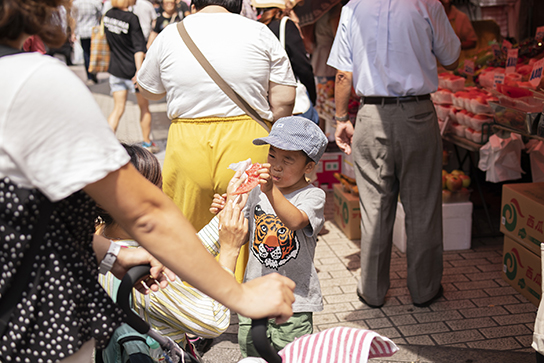Street Photography Quick Tip: Framing to Express a Subject’s Emotions
Photographing people in street photography is quite different from portrait photography, especially if you prefer an unobtrusive approach. There will probably be distracting elements around, you are capturing candid moments as they occur, and you definitely can’t pose your subjects! How do you work with all those to create an image that expresses the subject’s emotion? A street photographer shares one tip to try. (Reported by: Ikuko Tsurumaki, Digital Camera Magazine)

EOS R/ RF35mm f/1.8 Macro IS STM/ Aperture-priority AE (f/2.2, 1/2000 sec, EV -0.3)
A child sitting on the street. Surrounded by adults who tower over her, she must have been in distress. I wanted to convey those emotions, and in this article, I share the technique that I used.
The essence of street photograph: working with crowds, busy streets and other clutter
When doing street photography in a busy place, you may find the people around you obstructing your attempts at a good, unhindered shot of your subject. Yet, crowds, clutter and the “busy” nature of urban life contribute to street photography’s distinctive flavour, so you can say that the very spirit of street photography is about how you make use of them in your images.
You can choose to simplify “distractions”…or make use of them!
Place the subject in the gaps between people
One way to make use of the “crowded” feel is to include people in the foreground in front of your subject, and frame the image to suggest that you are onlooker, trying to catch a glance from the gaps between people. This not only enhances the sense of congestion, it also creates the idea of “hey, something’s happening, it’s attracting a crowd!”, which piques the viewer’s interest and adds to the image’s storytelling aspect.
This is what I did for the image above. The high angle completes the onlooker’s point of view effect for this situation.
Try it the next time you encounter similar situations. What other techniques or camera angles can you use along with this to further convey emotion?
See a similar point of view technique in this article:
Standard Lens Techniques: Using the Point of View to Draw the Viewer In
Useful feature: Eye Detection AF
Despite the different approaches For genres like street photography, you often need to get your shot quickly. It’s not just because the moment is fleeting—lingering around with a camera might attract more attention than you want! At the same time, it is also crucial to get the eyes of your main subject in sharp focus—just like for portrait photography. Turning on Eye Detection AF helps.

With Eye Detection AF, I acquired focus on this little boy easily, whereas otherwise, the AF might become "distracted" by the other people around him. Other situations where I’ve found it useful are:
- For quickly acquiring focus on faces when I’m using a wide aperture setting and the depth of field is shallow.
- When I’m taking a quick high angle shot with the camera held above my head.
Need to freeze moving subjects? Here’s a handy camera setting that prevents your shutter speed from getting too slow in semi-automatic exposure modes:
ISO Auto Tip: Prevent Subject Blur with this Must-know Setting!
For other useful street photography tips and techniques, see:
How to Capture Fascinating Images of Ordinary Things
How Do I Use Colour Accents to Draw Attention to a Subject?
Gestalt Theory in Street Photography
Silhouette Frame Composition: A Way to Spotlight the Mundane
Want to change the way you see things? Here are 2 exercises to try:
Rediscovering Centre Composition: 2 Exercises For Your Next Photowalk
Receive the latest update on photography news, tips and tricks.
Be part of the SNAPSHOT Community.
Sign Up Now!About the Author
A monthly magazine that believes that enjoyment of photography will increase the more one learns about camera functions. It delivers news on the latest cameras and features and regularly introduces various photography techniques.
Published by Impress Corporation
Born in Tokyo in 1972, Tsurumaki started learning photography while working with an advertising agency, and became a photographer after her career as an assistant. She is currently engaged in activities including photo shoots for magazines, writing articles, and conducting photography lectures and seminars.



































